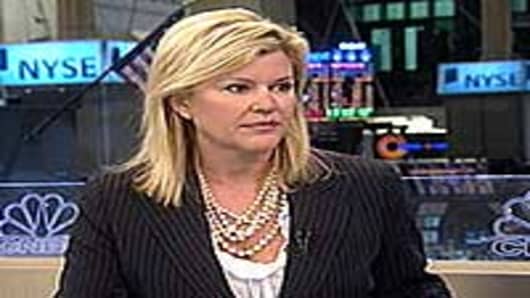But this is about more than state finance. This is also about Whitney herself and whether the massive amounts of credibility will stand that she built up by essentially calling the financial crisis ahead of everyone else.
Since making her call several months ago that the municipal bond market was about to be decimated by defaults, Whitney has found herself pilloried, rightly or wrongly, as an agent of doom where little is justified.
(Most recently, Deutsche Bank economist Brett Ryan, while not mentioning Whitney specifically, released a note to investors Wednesday that called muni fears “overblown” and cited increasing tax returns as an indication that state budget gaps would be closed more aggressively than previously thought.)
One of the main complaints against Whitney was the lack of specificity in her public proclamations. Mostly, she stuck with a theme that 100 or so defaults would result in “hundreds of billions” in damages.
That’s not out of the ordinary for Whitney, who has a tendency in her calls to be right in direction but wrong in degree.
In her Journal piece, she again offers few specifics about the level of damage, but she does toss around a few numbers to back up her claims: Local government spending over the past 10 years has grown by 65 percent while tax revenues are up only 32 percent; off-balance sheet debt of $1.3 trillion; states employ 19 million Americans while state spending accounts for 12 percent of US gross domestic product, amplifying how much pressure there will be.
She cites New Jersey, where the “ratio of total tax-supported state obligations to gross state product is over 30% and the fixed costs to service those obligations eat up 16% of the total budget.” Extrapolating and interpreting, Whitney concludes that if New Jersey were to fund its pension properly, it would take up 37 percent of the budget.
“The real issue here is the enormous over-leveraging of taxpayer-supported obligations at a time when taxpayers are already paying more and receiving less,” she writes.
The problem is bad—really bad—but no one will know how bad until we see where the economy is headed (probably nowhere) and whether states and municipalities can grow their way out of their debt, or will drown under the suffocating weight of their obligations.
As for Whitney: Her appearance in the Journal sends a pretty clear signal that she’s feeling a little better about her call. Why bring attention to yourself if you think you’re going to miss? Smart financial people make dumb calls all the time and, like the weather forecasters on TV, seldom get called on it. So if she’s feeling unsure, sending out reminders wouldn’t make sense.
A few weeks back, though, Whitney was at a conference in California when she said she had never felt more confident about a call in her life.
“These are just the facts,” Whitney states plainly in the Journal.
Indeed, this could be her best call yet.
___________________________________________
Questions? Comments? Email us at NetNet@cnbc.com
Follow Jeff @ twitter.com/JeffCoxCNBCcom
Follow NetNet on Twitter @ twitter.com/CNBCnetnet
Facebook us @ www.facebook.com/NetNetCNBC



